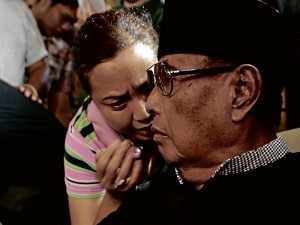
SOBERING NEWS Princess Jacel Kiram updates her father, Sultan of Sulu Jamalul Kiram III, on the bloodshed on Friday between Malaysian police and Kiram’s followers, who had refused to leave Sabah after their incursion on Feb. 9 to press their claim over what they call their homeland. GRIG C. MONTEGRANDE
What really happened?
President Benigno Aquino III on Friday ordered an investigation to determine what really happened in Sabah because of conflicting reports from the Malaysian authorities and the followers of the sultan of Sulu.
As of press time Friday night, Mr. Aquino was still in a meeting in Malacañang with select members of his Cabinet—Interior Secretary Mar Roxas, Justice Secretary Leila de Lima, Foreign Secretary Albert del Rosario, Defense Secretary Voltaire Gazmin and Executive Secretary Paquito Ochoa—discussing what steps to take to avoid further bloodshed.
“The President’s instruction is to get more information and to verify further,” said one administration official who declined to be identified because he had no authority to speak to journalists.
The official said the “reports were conflicting.”
“The Kirams claimed 10 of their followers had been killed. We have received notice from Malaysia that 10 of Kiram’s people have surrendered, and [Agbimuddin] has fled the area. That has yet to be confirmed. Where is he now, we don’t know,” the official said.
Sabah Police Commissioner Hamza Taib told a news conference yesterday afternoon that 12 members of Agbimuddin’s group were killed in the clash with policemen.
Two Malaysian policemen were killed and three or four were injured in the fighting, according to news reports from Malaysia.
Is it or isn’t it?
The Department of Foreign Affairs (DFA) said the standoff was over, but Agbimuddin adamantly said no and that they are fighting on.
There were reports that Sulu Sultan Jamalul Kiram III left his residence in Taguig City, but Palace sources said he had no appointment with the President.
The sultan could be headed to the Malaysian Embassy, the sources said.
Mr. Aquino earlier said that he would not talk to Jamalul unless the sultan recalled his followers who had been facing off with Malaysian security forces in Tanduao village in Lahad Datu town in Sabah.
Condolences
Last night, when things became clearer, Malacañang issued a statement condoling with the families of the 12 followers of the sultan killed in Tanduao.
“Since the onset, our primary goal had been to resolve the situation without violence. That is why President Aquino urged the followers of the Kiram family to lay down their arms and return home, so that their grievances can be addressed through sober, productive dialogue,” Communications and Strategic Planning Secretary Ricky Carandang said in the statement.
“There now exists a small window of opportunity to arrive at a peaceful conclusion to the situation in Lahad Datu; we are exerting every effort to seize that opportunity, and are hopeful that the Kiram family and their followers will seize it with us, so that further bloodshed may be avoided,” Carandang said.
President Aquino heard about the police raid on Tanduao, where Agbimuddin’s group had been holed up since Feb. 9, while stumping in San Fernando City, Pampanga, for his administration’s senatorial candidates in May’s midterm elections.
He had just begun speaking when he received the information, and begged off to return to Malacañang to monitor the situation in Sabah.
How confusion began
Confusion about what was happening in Sabah began with deputy presidential spokesperson Abigail Valte contradicting press reports of the police raid, saying no shots had been fired and there were no casualties.
Interior Secretary Roxas added to the confusion with his own report that Malaysian police fired warning shots and there were no reports of casualties.
Then Roxas came back saying there had been reports of two followers of the sultan killed in the clash and that the “situation had evolved rapidly.”
Going to court
The Kirams said they were pressing their claim to Sabah and that they wanted to raise it to the International Court (ICJ) of Justice and to the United Nations.
De Lima said she was studying the idea of bringing the claim to the ICJ.
“That’s one of the options we are studying,” she told reporters, referring to the government study of the Sabah claim.
“We will not only tackle the purely legal aspect [of the claim], we need to consider all the policies of the administration, including the foreign policy and diplomatic relations,” De Lima said. “This is complicated.” With reports from Jerome Aning and Jeanette Andrade

